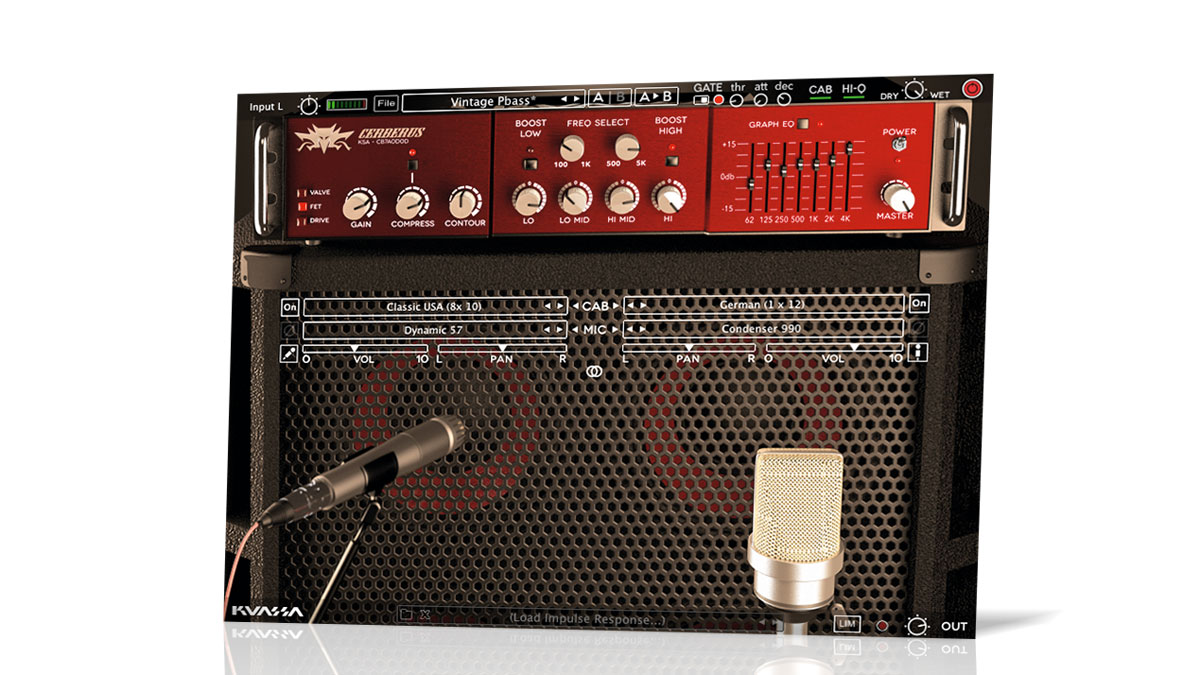MusicRadar Verdict
Another capable bargain from Kuassa, Cerberus can turn even the dullest of bass tones into something special.
Pros
- +
Three distinctive preamp types. Many further tone shaping options. Flexible cabinet and mic setup. DI option. Reason Rack Extension! Great value.
Cons
- -
No bypass button on EQ.
MusicRadar's got your back
Indonesian developer Kuassa is building a solid reputation for quality affordable plugins. Its latest, Cerberus (VST/AU/AAX, Reason Rack Extension), is a bass amp simulation with a well equipped amp head, twin cabinet modelling, and the ability to load external WAV format impulse responses, opening it up to third-party sampled cabinets.
It's topped and tailed by global input and output sections, each with level controls, and the input section also includes a noise Gate, Input Channel selection (L, R, Stereo or Sum), Dry/Wet mix, Hi Quality mode, input metering, preset handling and global bypass.
"Cerberus is excellent at giving clean DI'ed or sampled bass the kind of heft, drive and thump associated with real amps,"
The output section, meanwhile, houses a Limiter, output overload indicator and the aforementioned impulse response loader. It's important to note that Cerberus doesn't include any IRs of its own.
The amp head features three core preamp options - Valve, FET and Drive - which combine with the input Gain control to deliver the basic character of the amp. As with any modern hardware bass amp, you then get access to a plethora of tone-shaping controls.
First among them is a (bypassable) one-knob compressor, followed by a simple Contour control that progressively cuts the mid range while boosting high and low frequencies. Then there's a four-band EQ with high and low shelves (frequencies aren't specified, but we measured them at around 10kHz and 60Hz) and two peaking bands (100Hz-1kHz and 500Hz-5kHz) - all bands offer +/-10dB gain, although the two shelf Boost buttons add a further 10dB at their respective frequencies. Finally, the seven-band graphic EQ covers 62Hz-4kHz in one-octave bands.
The Master knob and Power switch pertain solely to the amp head, and you can switch out the head to use the cab sim on its own.
Bass in the place
Bass amps differ considerably from guitar amps in that their primary concern is clean amplification and tone shaping, rather than drive, dual channelling and effects. Nonetheless, Cerberus's three preamp types bring a welcome variety of flavours to the party.
Want all the hottest music and gear news, reviews, deals, features and more, direct to your inbox? Sign up here.
The Valve setting delivers primarily third and some second harmonic distortions, while the Drive setting creates multiple higher harmonics. We particularly like the fatness of the FET option, with its strong third-harmonic distortion. Also, as mentioned, you can switch out the amp completely and use the cabinet DI patch for some true amp-free sounds.
Cerberus' 14 factory presets provide a small selection of beefed-up, reasonably clean tones that all sound surprisingly different. We managed to push things much further, though, combining the EQ and Graphic EQ to conjure up more twangy sounds.
The Drive preamp option is pretty fuzzy, but at a low setting and with high Compression, we also achieved some slightly edgy tones. The input Gate has very fast attack and release, and so can be used to add bite when needed. Finally, the Hi Q (high quality) option improved top-end clarity somewhat.
Cerberus is excellent at giving clean DI'ed or sampled bass the kind of heft, drive and thump associated with real amps, and even lacklustre sources can be transformed into bruising, punchy tones. A bypass button on the main EQ would be good, but at this price, it makes up for any minor shortcomings with its impressive value proposition.
Computer Music magazine is the world’s best selling publication dedicated solely to making great music with your Mac or PC computer. Each issue it brings its lucky readers the best in cutting-edge tutorials, need-to-know, expert software reviews and even all the tools you actually need to make great music today, courtesy of our legendary CM Plugin Suite.

